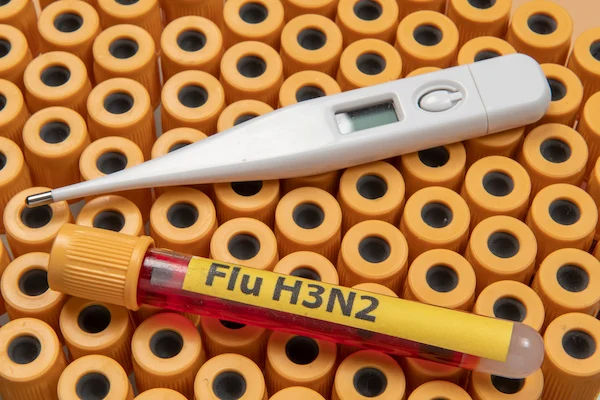Interleukin (IL-6) Test Overview
Discover the Interleukin-6 (IL-6) test, its purpose in detecting inflammation, the procedure, and how results assist in diagnosing infections, autoimmune disorders, and other conditions.

Written by Dr. J T Hema Pratima
Reviewed by Dr. Shaik Abdul Kalam MD (Physician)
Last updated on 13th Jan, 2026

If you or a loved one has been advised to take an Interleukin-6 (IL-6) test, you might be wondering what it is, why it’s needed, and how it can help in diagnosing or monitoring health conditions. This article will explain everything in simple terms so you can understand the test better and take informed steps toward your health.
What is the IL-6 Test?
The IL-6 test measures the level of Interleukin-6, a protein produced by your immune system. IL-6 plays a crucial role in inflammation, fighting infections, and healing injuries. However, too much IL-6 can indicate an overactive immune response, leading to chronic inflammation or autoimmune diseases.
Consult a Top Specialist
Why is the IL-6 Test Done?
Your doctor may recommend this test if they suspect:
1. Chronic Inflammation – High IL-6 levels are linked to conditions like rheumatoid arthritis, lupus, or inflammatory bowel disease.
2. Infections – Severe infections (like sepsis) can cause a spike in IL-6.
3. Autoimmune Disorders – Conditions where the immune system attacks healthy tissues.
4. Cancer – Some cancers (like multiple myeloma) increase IL-6 production.
5. COVID-19 Complications – High IL-6 levels may indicate severe inflammation in COVID-19 patients.
How is the Test Performed?
The IL-6 test is a simple blood test. A healthcare professional will draw a small blood sample from your arm, which is then sent to a lab for analysis. No special preparation is usually needed, but follow your doctor’s instructions if fasting is required.
Understanding Your Results
Normal Range: Typically, IL-6 levels are very low (less than 5 pg/mL).
High Levels: Could indicate inflammation, infection, autoimmune disease, or cancer.
Low Levels: Usually not a concern, but extremely low levels might suggest immune system suppression.
Your doctor will interpret the results based on your symptoms and other tests.
How Can You Manage High IL-6 Levels?
If your IL-6 levels are elevated, your doctor may suggest:
1. Medications – Anti-inflammatory drugs or biologics (like tocilizumab) that block IL-6.
2. Lifestyle Changes –
Anti-inflammatory diet (fruits, vegetables, nuts, fatty fish).
Regular exercise (helps reduce chronic inflammation).
Stress management (yoga, meditation).
3. Treating Underlying Conditions – If an infection or autoimmune disorder is causing high IL-6, treating that condition may help.
When Should You Consider This Test?
If you experience:
Persistent joint pain or swelling
Unexplained fatigue
Frequent infections
Symptoms of autoimmune diseases (rashes, digestive issues)
Discuss with your doctor whether an IL-6 test is necessary.
Book a Test or Consultation with Apollo 24|7
If your doctor has recommended an IL-6 test, you can easily schedule it through Apollo 24|7. Their trusted labs ensure accurate results, and expert doctors can guide you on the next steps.
Final Thoughts
The IL-6 test is a helpful tool in diagnosing and monitoring inflammation-related conditions. If you have concerns about chronic inflammation or autoimmune disorders, consult your doctor to see if this test is right for you. Early detection and proper management can make a big difference in your health journey.
Consult a Top Specialist
Consult a Top Specialist

Dr. Swagato Podder
General Practitioner
5 Years • MBBS
Kolkata
GRD POLYCLINIC, Kolkata

Dr. Soumen Paul
General Physician/ Internal Medicine Specialist
24 Years • MBBS
Kolkata
MCR SUPER SPECIALITY POLY CLINIC & PATHOLOGY, Kolkata
(50+ Patients)

Dr Aakash Andgi
General Physician/ Internal Medicine Specialist
9 Years • MBBS MD
Bengaluru
Apollo Clinic, JP nagar, Bengaluru

Dr. Khuda Baksh Nagur
General Physician/ Internal Medicine Specialist
11 Years • MBBS, MD (GENERAL MEDICINE), Certificate Programme clinicians in Diabetes Management
Bengaluru
Medwin multispeciality clinic, Bengaluru
(25+ Patients)

Dr. Rohit Basu
General Practitioner
8 Years • MBBS, DNB (General surgery)
East Midnapore
VIVEKANANDA SEBA SADAN, East Midnapore




